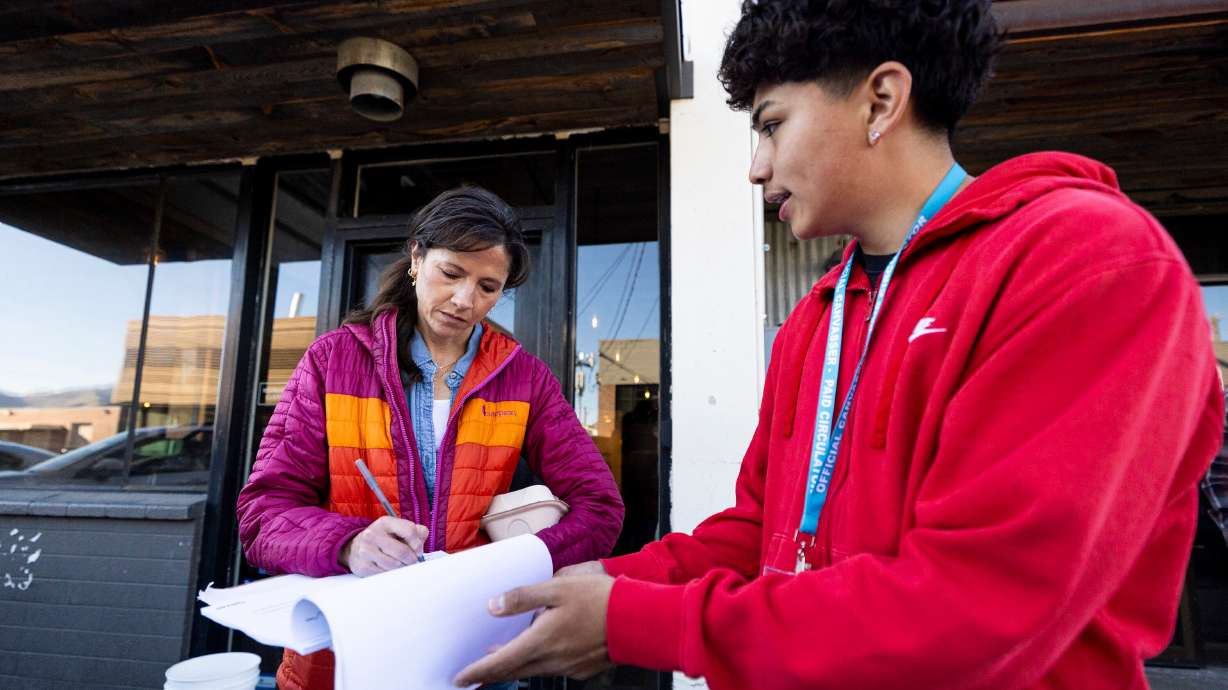Estimated read time: 5-6 minutes
- A new Deseret News/HarrisX poll showed 36% of Utahns support repealing a collective bargaining ban outlined in HB267.
- The referendum on HB267 will be on the 2026 ballot after gathering 251,590 verified signatures.
- Both sides plan campaigns to influence public opinion before the referendum vote.
SALT LAKE CITY — Over the last few months there's been a lot of discussion and controversy over Utah's law banning public sector collective bargaining and the referendum to repeal it. But how do Utahns actually feel about the law?
The Deseret News recently ran a poll with HarrisX asking over 800 Utahns what they think of the labor unions referendum movement in Utah. Here's a look at the response.
The law, HB267, was passed through the Utah Legislature this year and shortly after a group of public unions filed for a referendum against it.
How Utahns say they would vote on the referendum
Respondents to the poll were asked: "The referendum to repeal the law that bans public employee unions in Utah from collective bargaining recently qualified for the 2026 ballot. If the election were held today, would you vote in favor or against the referendum?"
Out of 805 registered voters, 36% said they would vote in favor of the referendum, 32% said they'd vote against and 31% said they don't know.
"This shows that while the referendum supporters gathered historic numbers of signatures, that's not necessarily translating directly to support for the referendum overall," wrote Kevin Greene, the state director of Americans for Prosperity Utah, who is in favor of HB267.
When it comes to party affiliation, Republicans were split almost perfectly into thirds, with 33% saying they'd vote in favor, 33% against and 34% saying they don't know.
"The recent poll confirms what we already know: Utahns stand with public workers, no matter their political affiliation. Support for the referendum is strong, and we see a significant opportunity to grow that support further," according to a statement from the Protect Utah Workers coalition.
Democrats had a stronger lean toward the referendum, with 50% saying they'd vote in favor, 27% saying they'd vote against and 23% saying they don't know.

"I think these results show that there's a lot of room to educate the public on what HB267 actually did and why it's good policy for Utah," Greene said. "We're already doing that through conversations at the grassroots level, and we're seeing support grow in favor of this new law when people get fully connected to it."
This survey was conducted online from May 16-21 among 805 registered voters in Utah by HarrisX. Respondents are recruited through opt-in, web-panel recruitment sampling. Recruitment occurs through a broad variety of professional, validated respondent panels to expand the sampling frame as wide as possible and minimize the impact of any given panel on recruiting methods.
The results reflect a representative sample of registered voters in the state. Results for voters were weighted for age, gender, race/ethnicity, income, political party, education, and congressional district. The margin of error for the sample is +/- 3.5 percentage points.
"It appears that every side, regardless of your position, has a lot of ground to cover, for, for or against," said Jason Perry, director of the Hinckley Institute of Politics at the University of Utah. "I expect, given these numbers, all, whatever side people are on, there will be a renewed effort to reframe the arguments for and against."
What does HB267 do?
David Osborne, the senior director of Labor Policy with the Commonwealth Foundation, shared what the different provisions of the bill are.
The first thing it does is prohibits collective bargaining for public labor union, which is what has drawn the most controversy. Collective bargaining is when an employer and a union come together to negotiate a contract for employees.
It also has a provision called paycheck protection "in Utah, that means that there's only so much union dues that can be collected via payroll deduction," Osborne said.
There is also a ban on government support for union activities, which includes "giving union employees paid leave to participate in union activities," as well as allowing unions to use certain spaces for free.
The law also puts an end to involving public sector unions in the state retirement system.
It also would provide liability insurance for teachers, which was previously only available through the unions.
"So that would take away the impulse for someone who doesn't want to be part of the union to join anyway," Osborne said.
There is also a transparency aspect to HB267, which would require unions to report to the labor commission their membership numbers and where they're spending their money.
This law only deals with public sector labor unions and has nothing to do with the private sector. Under HB267, unions would still have the right to exist and operate, they just would no longer be able to participate in collective bargaining.
What those in favor of the law say
While the law would impact all public sector unions in the state, teachers have been the focus of a lot of the arguments over HB267.
There have been multiple organizations that openly support HB267, one of these is Utah Parents United, which supports the law because they want schools to focus more on students and parents.
"It will take the focus off the politics in school, right, and then start putting the focus back on student success and our kids. And that's what education should be about. It should really be about our kids the end of the day and and that's why we love this bill," said Corinne Johnson, the founder and president of Utah Parents United.










